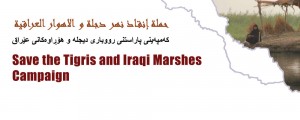For the next 4 days I will be in
Baghdad, and I would like you to see a different city through my eyes. Not a
city of daily terror attacks, and sectarian violence, but a Baghdad that is
working for peace, justice and human rights, a Baghdad that is not shown in
mainstream media, a Baghdad, that I like to trust and believe will be the new
Baghdad. If you are willing to wash away your stereotypes and open your eyes
and heart, you might see a more realistic Baghdad. Join me in my journey to the
first Iraqi Social Forum: Another Iraq is possible.
Day One: Arriving
in Baghdad, motives, fears and hopes
For the first few hours since we landed in Baghdad International Airport,
I couldn’t stop thinking: I’m finally in Baghdad, wow, I really am in Baghdad. It
was the first time that I set foot in Baghdad in my 3 years living and working
in Iraq. Actually, it felt more exciting than scary. Exciting, because I always had this picture of a majestuous Baghdad its old history as being the capital of the Muslim World during the Abbasid Empire, with the Tigris River at its centre, and much more because I would get to hear from young people about their idea to build a new Iraq and get to share my own ideas with them. Scary, because of the high risks I knew I
was taking by being here, but I couldn’t turn my back on Iraqis when they most
needed me. The work of peace and justice is neither safe nor easy, but that is exactly why Iraqis need global solidarity, and people to stand by them, to hold their hand as they work to build a strong civil society. As a team, we decided that
the reasons to go were stronger than the reasons to stay in our own countries. The
initial delegation was of around 50 people, but in the end, 15 people were
ready to go.
Even though I was influenced by media reports of increased violence, I was feeling very
strongly about coming to Baghdad. In fact, I always wanted to come, but because of visa issues, it was not possible. After all, 10 million of Iraqis live in
Baghdad, and I was convinced that Baghdad was something more than terrorist
attacks, and bombs. I wanted to show my solidarity with Iraqis, which live
every day and work for human rights, under very difficult conditions. The few
weeks before the forum there had been intense bombings all over the country,
yet the preparations and solidarity for the Iraqi Social Forum were always
there. Both internationals and Iraqis were busy with risk assessments, lots of
logistics, and after all this, we were finally here in Baghdad, it was a little
bit surreal.
It was amazing to see that what we had been working for more than 6
months was becoming a reality. A group of young volunteers had been trained on
translation, and will become for the next couple of days, our voice, and our
way to convey solidarity to Iraqi civil society. When you meet these young
people you realize that another Iraq is in front of your eyes. To see the
leadership and the incredible hard work transforms any preconceived views that
you could have of Iraq. Young, smart, with impeccable English skills and
demonstrating their leadership and capacity, just if you give them a chance.
For
those of you who are not familiar with the social forum process, it started in
Porto Alegre, Brazil in 2001, with the first World Social Forum, as an
alternative space for individuals, groups, organizations and those who believe
in the principles of social justice and human rights including political,
civil, social, economic, and cultural rights. The social forum platform is a
space to promote alternative answers to world economic problems in
opposition to the World Economic Forum in Davos, Switzerland.
The Iraqi Social Forum is one of the regional forums that
are organized in different regions and countries and is supported by
international solidarity activists. It comes in the context of global economic
crisis, the Arab Spring, together with the political crisis and the confusion
in the identity of the Iraqi state, which is dominated by disputes for power.
There is no attention to dialogue, or to building partnerships, and fostering
cooperation. Iraqis continue to suffer from increasing poverty and
unemployment, unequal access to opportunities, poor infrastructure, and a lack
of provision of social services such as electricity, medical care and
education. The Iraqi budget increases and with that, financial and
administrative corruption without establishing concrete achievements for Iraqi
citizens, support for real development, due to the political crisis and the
struggle for power and money, as well as sectarianism. Overlapping legal
authorities and the questionable independence of the judiciary. Weakness in
enforcing the rule of law, as well as international conventions, treaties, and
agreements, and continuing violations of human rights, especially freedom of
the press and freedom of expression.
In the forum there will be more than 140 self-organized events in Iraq
and solidarity activities organized all around the world. The Extended Iraqi
Social Forum started with events in Bangladesh and Pakistan on the 17th of
September. Many international organizations will connect with activists
at the Iraqi Social Forum through Skype (contact: isf.extensionteam) and watch
several sessions on streaming (check the streaming window on http://iraqsf.org/).
Read the Forum’s Statement here.



